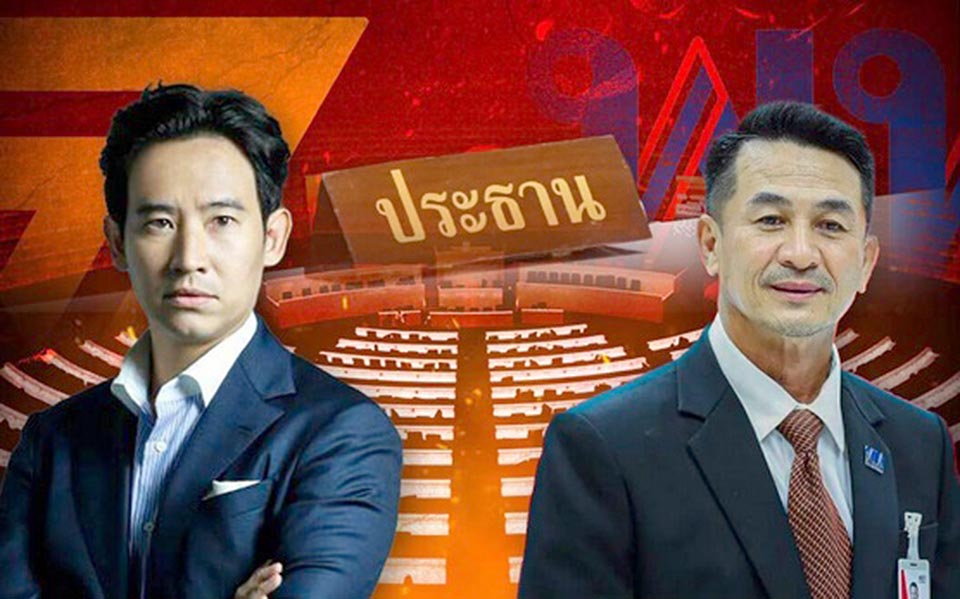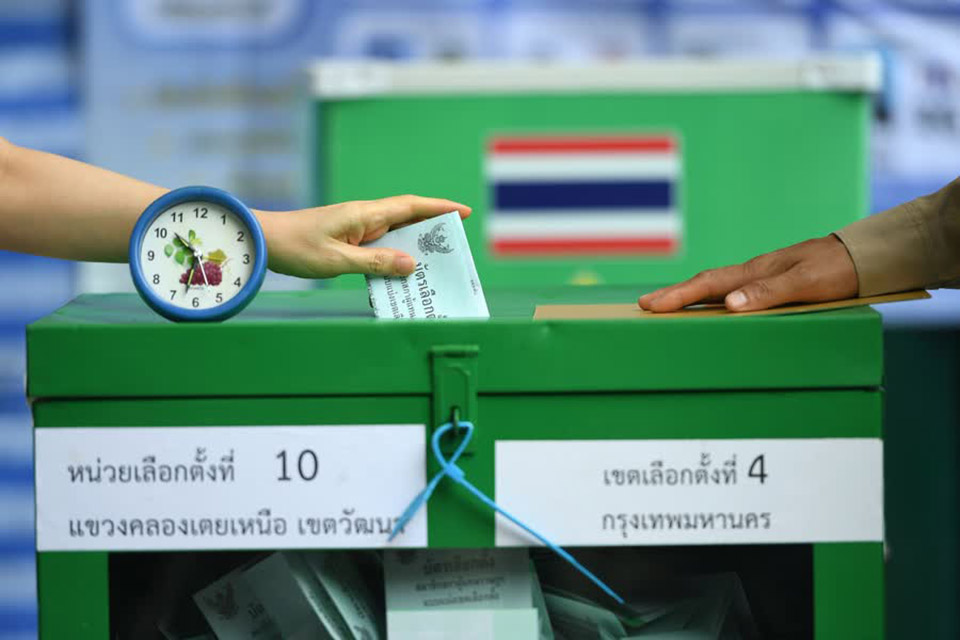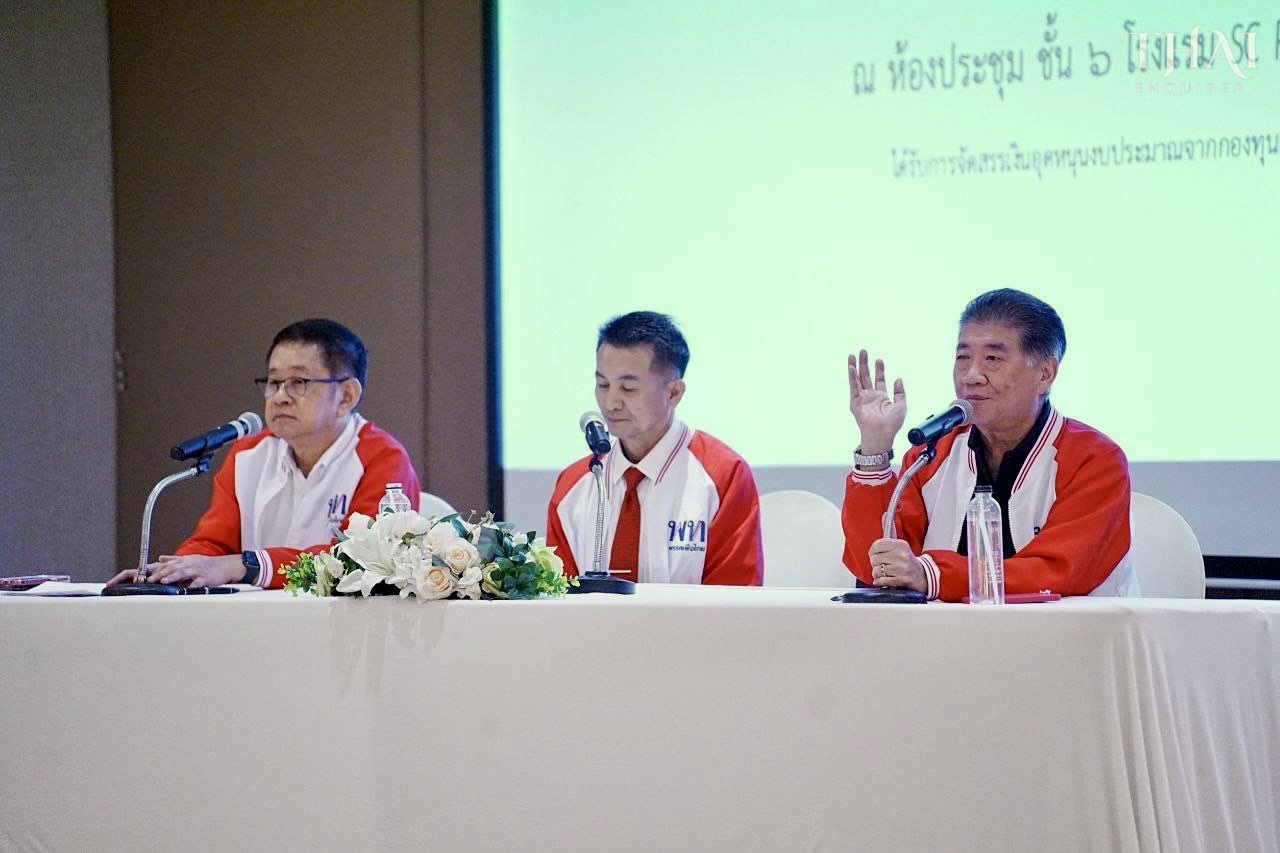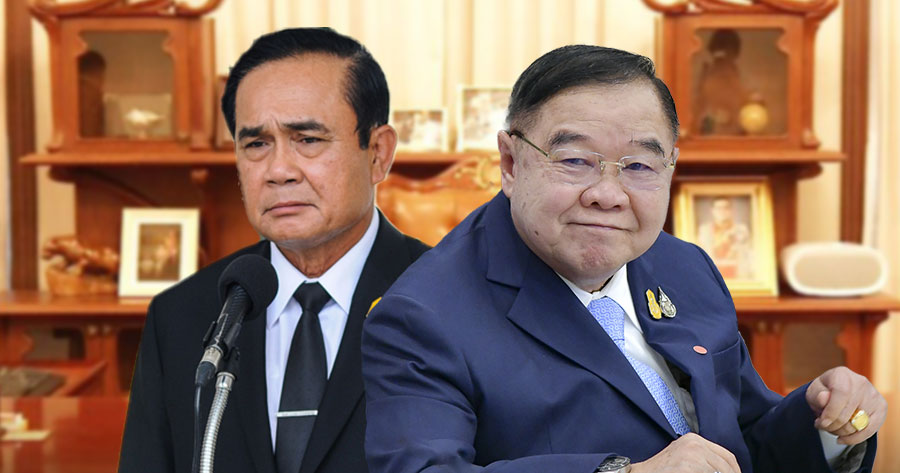Politics
Thailand’s Move Forward Party Struggles to Form a Government as Senate Investigates Pita
According to analysts, Thailand’s Move Forward Party’s (MFP) chances of successfully creating a coalition government appear to be fading with each passing day, despite its best efforts to remain calm. They all agree that even if an MFP-led coalition wins power, it may rapidly disintegrate due to possibly fatal internal turmoil.
An early symptom of such struggle is already seen, between the MFP and the Pheu Thai Party, the two most likely coalition partners.
According to some observers, the “marriage of convenience” is doomed to collapse when the MFP requires Pheu Thai more than the other way around.
To begin with, while the Move Forward Party emerged as the largest party in the election, it is in the minority in terms of what many describe as its harsh political ideology, which the party seeks to implement as government policy.
Such a position is illustrated by the Move Forward Party’s diligent work on difficult and delicate matters. The proposed modification to Section 112 of the Criminal Code, or the lese majeste statute, is at the top of its agenda, and it is gaining more enemies than friends.
The party has had to deal with criticism from its most ardent followers, who have called the Move Forward Party a “disgrace” for backtracking on eliminating Section 112 entirely.
When it comes to altering the provision, Pheu Thai has stated that it would want to remain on the fence for as long as possible and is adamantly opposed to eliminating provision 112.

Paetongtarn “Ung Ing” Shinawatra, head of the so-called Pheu Thai Family and the party’s No. 1 prime ministerial candidate, has stated that if and when legislation controlling a law reform is introduced, Pheu Thai would consider debating Section 112 in parliament. However, the party has indicated that it will only go so far in terms of collaboration in the topic.
According to commentators, the Move Forward Party’s position on the Section 112 dispute has isolated, if not ostracised, the party, and being alone at this critical juncture is not at all beneficial.
Political events are looming that will either shatter or make the MFP as a ruling party. Parliament will tentatively meet the day after it reopens following the election to pick a new House speaker on July 6.
According to the Bangkok Post, the House speaker election will determine whether the Move Forward Party has a chance to head the next administration.
Both the MFP and Pheu Thai are adamant about gaining control of the legislative branch. The MFP sees it as a critical route for listing the laws it wants to push into the parliamentary agenda, whilst Pheu Thai believes that as the coalition’s second-largest partner, with only 10 seats less than the MFP, it deserves the job just as much as the MFP.
Several previous House speakers did not represent the majority party. Despite being the fourth-largest party in the 2019 election, Democrat Party patriarch and former premier Chuan Leekpai was elected House speaker and parliament president.
It is typical for parties to enter into a gentleman’s agreement to vote for a House speaker from within their own ranks after reaching an agreement with potential coalition partners to establish a government. That is, provided that no two potential coalition partners are bidding for the position.

This time, the MFP and Pheu Thai are colliding, paving the way for a free vote to select the new House speaker. If that is the case, there will be no “customary” voting pattern, as the MFP and Pheu Thai will be fighting for the position.
Nonetheless, Pheu Thai’s nominee is likely to receive more support, even from the opposition bloc, than the MFP’s.
Parties, including those in the current government coalition led by the Palang Pracharath Party, have more in common with Pheu Thai than with the MFP, notably on Section 112.
Not only do these parties not consider deleting or even revising Section 112 to be a priority, but they also feel it might spark huge protests, jeopardising the life of a government.
Observers believe that if Pheu Thai wins the speakership, it will sever what remains of its good relations with the MFP, jeopardising the latter’s chances of winning Pheu Thai’s support for Pita Limjaroenrat, the MFP leader, becoming premier.
The prime minister’s election in parliament has been moved up since the polling agency validated all 500 MPs ahead of schedule. Without the support of Pheu Thai’s 141 MPs, Mr Pita has no chance of becoming the country’s next leader.

After the Election Commission (EC) endorsed all 500 newly-elected MPs, political parties are preparing for their first critical vote.
The first parliamentary session must be summoned within 15 days of the EC endorsing at least 95% of all MPs-elect, according to Section 121 of the constitution.
Following the official opening, their first responsibility will be to select the House speaker and two deputies from among themselves. It is largely assumed that they will be chosen within 10 days of the new legislative session commencing.
The Move Forward Party (MFP) and the Pheu Thai Party, both candidates for speaker, are currently discussing on who will lead the legislative branch.
According to analysts, it is not surprising that both believe they are entitled to the post given their House seats won in the May 14 election were not far away.
The MFP, which received 151 seats, maintains that it is traditionally entitled to the post as the election winner. With numerous critical items of legislation that the MFP is required to introduce in parliament, the party feels compelled to acquire the gavel.
Pheu Thai, which got 141 seats, claims that because the difference in seats won by the two parties is so minor (only 10 seats), the position of House Speaker should go to it.
Furthermore, in comparison to the MFP’s “novices,” Pheu Thai has numerous candidates who are well-versed in laws and parliamentary procedures.

The two sides’ issue disappeared from media attention once they resolved to settle it through conversation. The matter resurfaced early this week, however, when Pheu Thai deputy leader Phumtham Wechayachai was quoted as stating his party had agreed to hand over the position to the MFP in exchange for two Pheu Thai deputy House speakers.
While several academics praised Mr Phumtham’s words and Move Forward Party secretary-general Chaithawat Tulathon for honouring the voices of the people who voted for the two parties, some Pheu Thai MPs were enraged and did not hide their feelings.
They requested that Mr Phumtham first debate and resolve the matter within the party.
Despite the fact that the Move Forward Party gained just 151 seats, far short of a majority in the 500-seat house, Pheu Thai list-MP Adisorn Piangket feared the party was making too many compromises.
Previously, the experienced lawmaker proposed that if the two parties could not achieve an agreement on the subject, it should be resolved by a free vote in parliament.
“We’ve agreed to let the Move Forward Party be prime minister, so why should we cave to their demand for the House speakership?” I wouldn’t say anything if the Move Forward Party won by a landslide. “They only got 151 seats,” Mr Adisorn remarked.

According to him, Pheu Thai has done all possible to avoid clashes with the MFP in order to keep the bloc together and prevent the other side from forging a rival coalition led by Palang Pracharath Party (PPRP) leader Prawit Wongsuwon as prime minister.
Mr Adisorn stated that as long as the Senate is able to co-select the prime minister, a PPRP-led minority administration with 188 seats from the former governing coalition cannot be ruled out.
“We’ve tried not to incite conflict because we’re concerned about a competing coalition.” “The coalition government may nominate Gen Prawit as Prime Minister, and it is possible that he will receive Senate support and defeat the MFP leader,” he said.
Mr Phumtham, on the other hand, has stressed that he did not mean to imply that the party was abandoning its bid for House Speaker. In fact, he was advocating the concept that the position should be given to the party that received the most votes in the general election.
According to a Pheu Thai source, the party is backing down in its fight for the top legislative job because key players in both Pheu Thai and the Move Forward Party don’t see how MFP leader Pita Limjaroenrat can overcome the challenges he confronts in becoming prime minister.
To support Mr Pita’s bid, the MFP-led coalition requires 376 votes in parliament from MPs and senators. Given his dubious qualifications, convincing MPs and senators to vote for him will be difficult.
“The Move Forward Party will desperately need the House Speaker position to compensate for losing the PM role.” “Pheu Thai understands this and will give the House Speaker position to the MFP,” stated the source.
Thailand’s Senate probes Move Forward Party Leaders assets
Pita Limjaroenrat, the head of the Move Forward Party (MFP), may face additional obstacles in his campaign to become the next Prime Minister, as a Senate panel is currently investigating problems connected to his assets and debts disclosure.
This could call his qualifications into question and convince more senators not to vote for him in parliament.
Senator Seree Suwanpanont, chairman of the Senate committee on political development and public engagement, announced on Friday that the committee had initiated a new investigation into Mr Pita’s qualifications and eligibility to run in the May 14 election.
“The committee is gathering information from appropriate agencies.” It concerns issues about Mr Pita’s assets and debt, both of which are related to his qualifications,” Mr Seree explained.
Mr Seree stated on June 8 that political activist Ruangkrai Leekitwattana, a Palang Pracharath Party (PPRP) member, had petitioned the Election Commission (EC) to investigate whether Mr Pita’s land plot in Prachuap Khiri Khan’s Pran Buri district is an asset he inherited from his father, who died in 2006.
Mr Ruangkrai also requested that the poll agency obtain details about Mr Pita’s assets and debts declaration from the National Anti-Corruption Commission for use in the investigation, according to Mr Seree.
According to a source, the most recent issue involving Mr Pita involves Oil For Life Co, a business managed by Mr Pita’s family, and Mr Pita worked as its executive between October 5, 2006, and March 6, 2017.
According to the source, the company has a loan debt of 460 million baht and filed for rehabilitation with the Central Bankruptcy Court after multiple financial institutions, which are its debtors, took court action to collect debt repayments.
Mr Seree went on to state that 20 senators have pledged support for any prime ministerial candidate from the party that received the most votes in the election.
“However, most of those senators did not mention Mr Pita’s name.” As far as I know, some of those who did mention Mr Pita’s name have since changed their minds.”
It involves questions with Mr Pita’s assets and obligations, which are tied to his qualifications, according to Senator Seree Suwanpanont.
The EC is also looking into Mr Pita’s claimed ineligibility to run in the election due to his ownership of iTV Plc at the time.
Mr Pita, the Move Forward Party’s sole candidate for prime minister, is suspected of being unable to run since he possessed 42,000 shares in iTV, which some critics claim is an operating media corporation, when he declared his candidature in the previous election.
Mr Pita has refuted the accusation, claiming that he was merely acting as executor of the family’s inherited shares.
Thitichet Nuchanart, an EC member, stated that the EC would question iTV executives including Mr Pita.
Mr Thitichet stated that the EC would also look into additional evidence linked to the claims, such as the record of iTV’s most recent shareholder meeting and the transcribed minutes.
A difference between the official minutes of the shareholders meeting and a video of the April 26 event has added to the debate concerning iTV’s position as a running media firm.
Mr Thitichet stated that more information about Mr Pita’s assets declaration with the NACC would be required for the EC’s probe.
According to Pol Maj Gen Supisarn Bhakdinaruenart, an MFP list-MP, the party’s executives told members not to respond to senators who have been critical of the party.
However, he stated that conversations are underway to gain their support, and that there are encouraging indicators that Mr Pita would acquire enough traction to become the next Prime Minister.
The 250 senators nominated by the now-defunct coup-engineering National Council for Peace and Order can vote in parliament to elect a prime minister alongside MPs.

Politics
Millennials in Canada Have Turned their Backs on Justin Trudeau

Justine Trudeau and his Liberal Party are currently engaged in a fierce battle for second place against Jagmeet Singh’s socialist NDP, as both parties find themselves trailing by 20 points behind Pierre Poilievre’s Conservatives.
A recent poll indicates that 38% of Canadians consider Trudeau to be the most ineffective leader the nation has encountered in over fifty years. An impressive 47% of Canadian Millennials indicated they would support Poilievre if an election were to take place today, while nearly half of all Canadians express a desire for an election to be called this year.
Pierre Poilievre’s strong appeal among young voters can be attributed primarily to economic factors: soaring inflation, a pressing cost-of-living crisis, and the challenge of housing affordability are pushing many away from the Liberals, who have held power for nearly nine years.
According to UnHeard, Millennials are increasingly distancing themselves from Trudeau due to his stringent measures aimed at controlling the internet to combat alleged disinformation, as well as his climate change initiatives, notably the carbon tax.

Protest in downtown Toronto against mass immigration on Canada Day – TNC Image
An increasing number of Canadians are becoming aware of Trudeau’s ineffective policies and his approach to mass immigration. This past summer, there was significant outrage among parents of teenagers and young adults as they observed their children remaining at home without jobs.
The primary concern stemmed from the fact that most low-skilled and entry-level positions were being filled by unskilled, temporary foreign workers, predominantly from India.
There has been a notable rise in criminal activities linked to international students and unvetted temporary residents who are becoming involved with Punjabi gangs in Canada, contributing to a surge in auto thefts nationwide.
Pierre Poilievre and the Conservatives are actively seeking to alter Trudeau’s approach to mass immigration and prioritize the construction of more housing should they come into power.
Significantly, Pierre Poilievre is perceived as more trustworthy than Trudeau, with over half of Canadians characterizing Poilievre as “open and honest about his actions, decisions, and intentions,” while only 39% share that sentiment regarding Trudeau.
The characteristics in question may shed light on Poilievre’s favorable polling, particularly among younger voters and women, who have historically leaned towards the Liberals or the NDP rather than the Conservatives.
The Liberal Party’s support has dwindled to an estimated 7% of Canadians, revealing a significant number of disillusioned voters eager for transformation. Poilievre is emerging as the type of leader that resonates with the desires of many Canadians.
Related News:
Trudeau Now Using Abortion Scare Tactics to Recapture Voters
Trudeau Now Using Abortion Scare Tactics to Recapture Voters
Politics
U.N. Special Rapporteur Calls on Thailand’s Banks to Cut-Off Myanmar Junta

The U.N special rapporteur for human rights in Myanmar has said the Bank of Thailand, commercial banks, and the anti-money laundering office are working on measures to stop the Myanmar Junta from acquiring weapons through Thailand’s banking system.
Tom Andrews the U.N. special rapporteur for human rights in Myanmar, said that some banks commercial in Thailand had aided Myanmar Junta’s by facilitating transactions that supplied military equipment to the Junta through the international banking system.
He called on the Bank of Thailand and financial institutions to do more to stop Myanmar’s junta acquiring weapons which they use on civilians to maintain power.
The special rapporteur was in Bangkok to address a parliamentary committee on security, he called on the Thai government to stop financial transactions that help supply weapons to Myanmar’s junta in line with a plan promoted by the Association of Southeast Asian Nations (ASEAN) that sets out an end to violence as a first step toward peace.
In his 2023 report “The Billion Dollar Death Trade,” Andrews noted that Singapore had implemented a clear policy opposing the transfer of weapons to Myanmar.

Thai Baht – File Image
Thailand’s Banks Lacked Clear Policy
As a result, exports of weapons and related materials from Singapore-registered entities using the formal banking system dropped from almost U.S. $120 million in fiscal year 2022 to just over $10 million over the next 12 months.
However, he said Thailand had no explicit policy position opposing weapons transfer to the Myanmar Junta, which saw exports from Thai-registered entities more than double in 2023, from just over $60 million to nearly $130 million.
He called on Thai Government to conduct a thorough investigation into transfers as Singapore had done into its companies’ dealings.
Andrews told the the committee that five Thai commercial banks and Thai-based companies were assisting Myanmar’s junta obtain weapons, dual-technology items and jet fuel, enabling Military Junta to conduct atrocities against the people.
But said he had found no evidence that the Thai government was involved or was aware of the transactions or that Thai commercial banks had knowledge.

Photo courtesy of The Nation
Banks Condemn Myanmar Junta Violence
Meanwhile representatives from Thailand’s central bank, anti-money laundering office and the commercial banks named in the report were also present at the parliamentary meeting at government house in Bangkok.
A representative of the Bank of Thailand said officials were working with the commercial banks and the anti-money laundering office to make sure that enhanced oversight was properly practiced.
The Thai Bankers Association that was also at the parliamentary meeting said it did not have the means to investigate and monitor such irregularities beyond Thailand’s borders.
Mr. Pongsit Chaichatpornsuk, a Thai Bankers Association representative told the committee that If government security agencies tell us, we will stop transactions. We don’t support arms procurement by Myanmar Junta or any military government to violate human rights.
Thailand, which shares a long border with Myanmar and hosts many thousands of refugees fleeing conflict there, has tried to promote dialogue between Myanmar’s military rulers and opposition forces but no progress has been made.
This Article was first published in RFA
Politics
People Rushing Sign Online Petition to Impeach South Korea’s President Crash Site

The Speaker of the National Assembly of South Korea said in a statement that an online petition calling for South Korea’s President Mr. Yoon Suk-yeol’s impeachment crashed due to the enormous number of individuals attempting to sign the petition. Saying the National Assembly would resolve the matter as quickly as possible.
Since the petition was launch on the National Assembly’s website on June 20, more than 811,000 people have signed it. The petition urges Parliament to introduce legislation to impeach President Yoon on the grounds that he is unfit for office.
Late on June 30, National Assembly Speaker Mr. Woo Won-shik issued an apology for the disturbance and stated that Parliament would take action to protect the public’s fundamental rights.
People attempting to access the petition on July 1 experienced delays of up to four hours. At one point, an error message indicated that more than 30,000 individuals were waiting to access the site.
South Korea’s Parliament Hesitant
The online petition accuses Yoon of corruption, escalating the risk of conflict with North Korea, and endangering South Koreans’ health by failing to prevent Japan from leaking treated radioactive water from the destroyed Fukushima nuclear power plant.
By law, Parliament must assign every petition signed by more than 50,000 people to a committee, which will then decide whether to put it to a vote in the assembly.
However, the opposition Democratic Party, which has a majority in Parliament, is hesitant to turn the petition into an impeachment bill, according to media reports, with a spokesperson stating that the party has yet to address the topic.
The Parliament can impeach a president with a two-thirds majority. The Constitutional Court then deliberates the motion and decides whether to remove or reinstall the president.
Meanwhile, on Monday Reuters reported North Korea criticized a joint military exercise performed this month by South Korea, Japan, and the United States, according to official media, saying such drills demonstrate the three nations’ alliance has evolved into “the Asian version of NATO”.
On Thursday, the three countries began large-scale combined military drills named “Freedom Edge” featuring navy destroyers, fighter fighters, and the nuclear-powered US aircraft carrier Theodore Roosevelt, with the goal of strengthening defenses against missiles, submarines, and air strikes.
The drill was designed at a three-way meeting at Camp David last year to boost military cooperation amid concerns on the Korean peninsula caused by North Korea’s weapons testing.
Pyongyang will not overlook the strengthening of a military bloc led by the United States and its allies, and it would respond aggressively and decisively to defend regional peace, according to North Korea’s foreign ministry, as reported by KCNA.
-

 News3 years ago
News3 years agoLet’s Know About Ultra High Net Worth Individual
-
Entertainment2 years ago
Mabelle Prior: The Voice of Hope, Resilience, and Diversity Inspiring Generations
-

 Health3 years ago
Health3 years agoHow Much Ivermectin Should You Take?
-

 Tech2 years ago
Tech2 years agoTop Forex Brokers of 2023: Reviews and Analysis for Successful Trading
-

 Lifestyles3 years ago
Lifestyles3 years agoAries Soulmate Signs
-

 Movies2 years ago
Movies2 years agoWhat Should I Do If Disney Plus Keeps Logging Me Out of TV?
-

 Health3 years ago
Health3 years agoCan I Buy Ivermectin Without A Prescription in the USA?
-

 Learning2 years ago
Learning2 years agoVirtual Numbers: What Are They For?